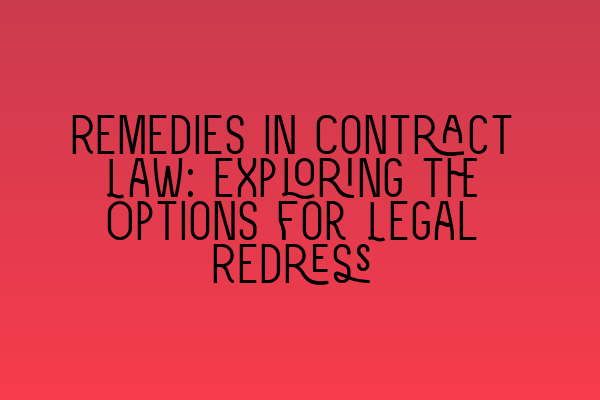Remedies in Contract Law: Exploring the Options for Legal Redress
In the complex world of contract law, disputes are bound to arise from time to time. When parties enter into a contractual agreement, they often do so with the expectation that the terms will be upheld. However, unforeseen circumstances or disagreements can lead to breaches of contract, leaving one or both parties seeking legal redress.
Contract law provides a range of remedies to address these breaches and offer compensation or specific performance to the injured party. In this article, we will explore the various options available for legal redress in the context of contract law and shed light on their significance when seeking resolution.
1. Damages
One of the most common remedies in contract law is the award of damages. Damages aim to compensate the injured party for the loss suffered as a result of the breach of contract. These losses can include financial harm, reputational damage, or emotional distress.
The amount of damages awarded depends on several factors, including the level of loss incurred, foreseeability of damages, and mitigating actions taken by the injured party. There are different types of damages, including:
- Compensatory Damages: These are designed to put the injured party back in the position they would have been in had the contract been performed.
- Consequential Damages: These are awarded for losses that do not directly flow from the breach but are the foreseeable result of the breach. An example would be lost profits.
- Punitive Damages: These are rare in contract law and are awarded to punish the breaching party for their misconduct.
For a deeper understanding of how damages play a role in legal practice and decision-making, check out our article on Unveiling Real-Life Case Studies: Insights into Legal Practice and Decision-Making.
2. Specific Performance
In some cases, damages alone may not adequately compensate the injured party or restore the balance that the contract intended to achieve. In such situations, the court may order specific performance as a remedy.
Specific performance requires the breaching party to fulfill their contractual obligations precisely as stated in the agreement. This remedy is typically sought when the subject matter of the contract is unique or when monetary compensation is insufficient to address the harm caused by the breach.
A prime example of when specific performance may be appropriate is in real estate transactions, where each property is considered unique. If the seller breaches the agreement, the buyer may request the court to order the seller to transfer the property as initially agreed.
3. Rescission
Rescission is a remedy that voids the contract and releases both parties from their obligations. It is typically sought when one party has been induced into entering the contract due to fraudulent misrepresentation, duress, undue influence, or mistake.
Rescission allows the parties to unwind the contract and seek restitution by returning any benefits received under the agreement. It aims to restore the parties to their original position as if the contract never existed.
4. Injunctions
When contractual breaches involve ongoing actions or potential harm, injunctive relief may be appropriate. An injunction is a court order that requires a party to either stop doing a particular action (prohibitory injunction) or to perform a specific act (mandatory injunction).
Injunctions are often sought to prevent irreparable harm or to maintain the status quo until the dispute can be resolved. They are commonly used in cases involving non-compete or non-disclosure agreements, where monetary compensation may not be sufficient to protect the injured party’s interests.
For more insights into the skills needed to enhance trust and loyalty in client relationships, read our article on Mastering Client Relationship Management: Skills for Solicitors to Enhance Trust and Loyalty.
5. Liquidated Damages
Contracts sometimes include a provision for liquidated damages, which sets a predetermined amount of damages in the event of a breach. Liquidated damages clauses can serve as an alternative to seeking compensatory damages through litigation.
To be enforceable, liquidated damages must be a genuine pre-estimate of the loss likely to be suffered. If the amount identified is seen as a penalty rather than a genuine estimate, the clause may be deemed unenforceable by the courts.
Conclusion
Contract law offers a range of remedies to address breaches, allowing injured parties to seek appropriate legal redress. Whether through damages, specific performance, rescission, injunctions, or liquidated damages, the aim is to restore balance and compensate for the harm caused by the breach.
If you’re interested in other aspects of the legal profession, check out our related articles:
- Exploring Solicitor Salaries in the UK: Average Earnings and Factors Affecting Income
- Pursuing a Law School Education in the UK: Choosing the Right Path for Your Future
- Securing Training Contracts: A Roadmap to Becoming a Solicitor
Remember, contract law can be complex, and seeking advice from a qualified solicitor is crucial to ensure the best possible outcome in your case.
